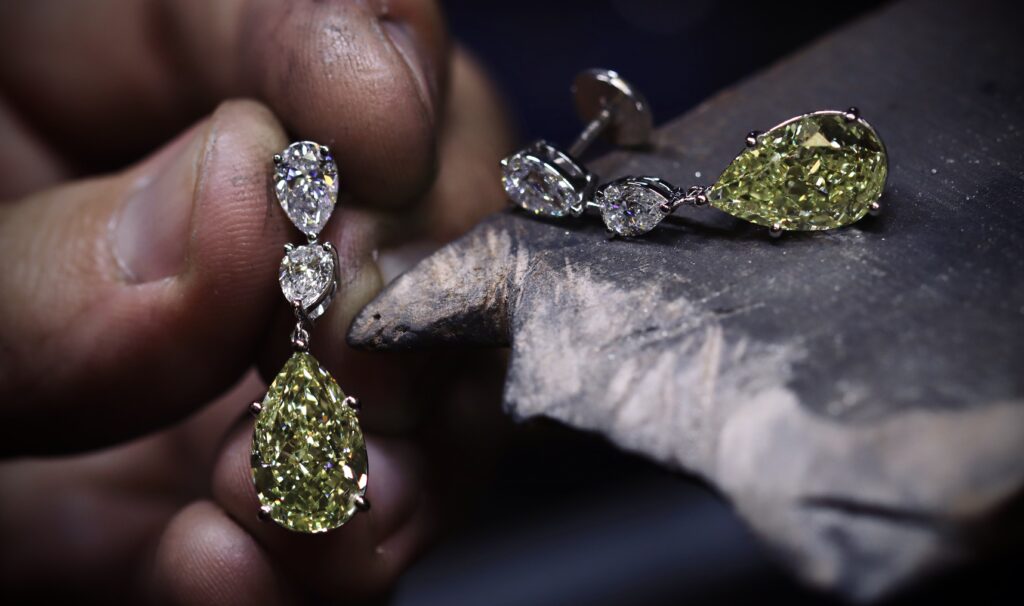The diamond insider’s tips to keep your jewellery looking its best

As well as being financially valuable, fine jewellery like diamond engagement rings, necklaces and bracelets can also hold immense sentimental value. Taking the time to properly care for your jewellery will ensure it keeps on looking its best for years to come”, said bespoke jewellery specialist Henry Pruwer, who is based at Hatton Garden in London. Henry had this advice on how to best care for your jewellery.
1. Choose jewellery to suit your lifestyle. A busy lifestyle can play havoc with jewellery, particularly rings which are the most exposed. Take your lifestyle into account when buying jewellery, including your job and hobbies, perhaps opting for platinum as it’s a stronger metal, six claws to hold a diamond in place on an engagement ring instead of four and a lower setting to protect stones from damage.
2. Avoid grease. Diamonds have many unique qualities, refracting light, super-conducting both electricity and heat, and repelling water. One thing diamonds love, however, is grease, which will instantly cling to any stone. Apart from making the ring look dirty, grease will also block the light and stop your diamond ring from sparkling in the way it should. Wear gloves when cleaning, and if you remove your ring to cook, place it in a small dish on a shelf so it doesn’t get lost.
3. Insure your investment. An essential piece of aftercare advice for any treasured piece of jewellery is to insure it, just as you would insure your car or your home. Most insurance policies will insist on a regular health check for your jewellery, providing you with that essential reminder to ensure your jewellery is always looking its best.
4. Keep it clean. An easy way to clean a diamond is to rub it with a lint free cloth, such as a glasses cloth. To properly clean, take the jewellery off and place in a bowl of lukewarm water, never clean diamonds in the sink, for fear of losing them. Clean the diamond with a toothbrush sprinkled with a few drops of washing up liquid, gently scrubbing from all sides and removing any dirt and grease, before rinsing in the water. If the ring has not been cleaned for some time, you may need to repeat this a few times. The result will be stunning! It isn’t necessary to use vinegar or specialist products.
5. Regular checks. Just as you’d take your car in for a regular service, taking your jewellery for a regular ‘service’ maintains its health and longevity. Stones may have loosened over time, settings may have become knocked out of line. A regular check from a jewellery expert, ideally once a year but certainly every 2 years, can spot potential issues and rectify them.
6. Protect jewellery when playing sport. Going to the gym might be good for your body and mind, but it’s not always great for your jewellery. One of the most common causes of jewellery damage is through sport and gym use, particularly lifting weights. Remove your diamond rings for the gym or sport if you can, ideally before you leave home, even placing around your neck on a necklace. Try to avoid taking your engagement ring off in public though as it’s so easy to place it on a surface and lose it.
7. Professional results. I’m often asked about ultrasonic cleaners and whether they are worth the investment. Ultrasonic cleaners work through high frequency sound waves, causing the water to vibrate as you clean. If used properly, following the instructions precisely, they are fine. If you’re unsure or uncomfortable with doing this yourself, a professional polisher can polish your jewellery to a mirror finish using cloths impregnated with chemicals, smoothing any little bumps or scratches.
8. Make sure it fits comfortably. Your engagement ring will likely be sized for you when you become engaged, but it’s important to keep an eye on whether the ring still fits comfortably. Weight loss could make the ring loose, just as the summer heat could cause your fingers to expand. A ring should stop at the knuckle bone, and need a twist to take it off fully.
9. Safe storage. Diamond is the hardest substance known to man but can still get damaged, particularly by another diamond. If you are storing your jewellery, put each piece into its own pouch and in its own compartment. Diamond earrings should each have their own pouch so they don’t rub against each other and cause scratches.
10. Metal maintenance. Certain metals, such as white gold, need to be rhodium plated every few years or as soon as tarnishing becomes visible. Rhodium plating will bring back a bright white finish with better protection, making it more durable. A general rule to keep all metals looking their best, from platinum and white gold to rose and yellow gold, is to avoid letting the metal come into contact with bleach which may damage the metal.
11. All is not lost. Finally, it is useful to remember that even if your jewellery does get damaged, all is not lost. It is very rare for a ring or piece of jewellery to be damaged beyond repair, even structural damage to a ring can usually be rectified by an experienced goldsmith with the help of a laser machine.




